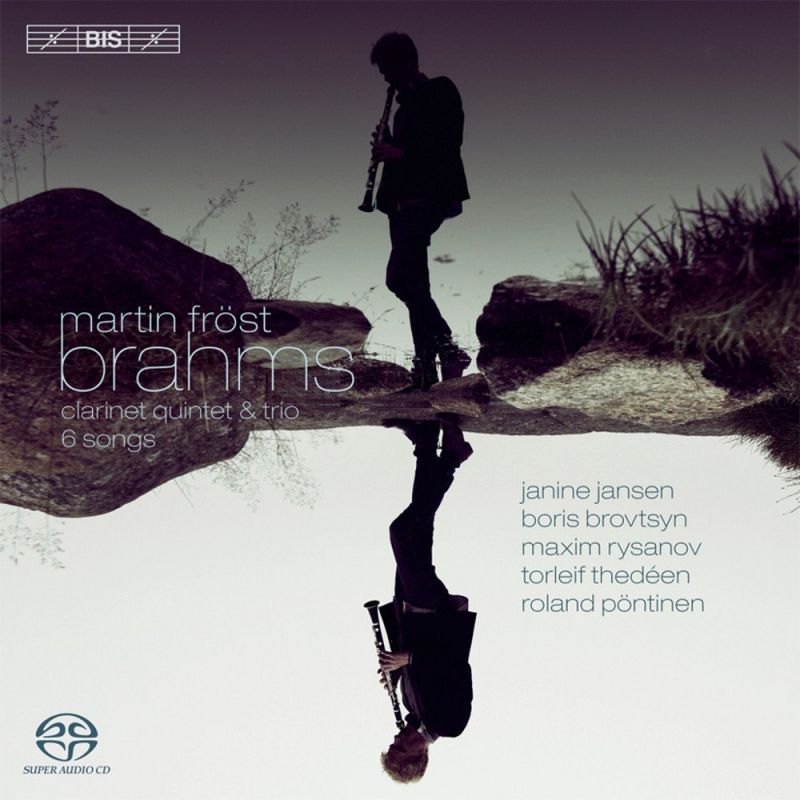BRAHMS Clarinet Quintet. Clarinet Trio
View record and artist detailsRecord and Artist Details
Composer or Director: Johannes Brahms, Roland Pöntinen
Genre:
Chamber
Label: BIS
Magazine Review Date: 07/2014
Media Format: Super Audio CD
Media Runtime: 79
Mastering:
DDD
Catalogue Number: BIS2063

Tracks:
| Composition | Artist Credit |
|---|---|
| Quintet for Clarinet and Strings |
Johannes Brahms, Composer
Boris Brovtsyn, Violin Janine Jansen, Violin Johannes Brahms, Composer Martin Fröst, Cello Maxim Rysanov, Viola Torleif Thedéen, Cello |
| Trio for Clarinet/Viola, Cello and Piano |
Johannes Brahms, Composer
Johannes Brahms, Composer Martin Fröst, Clarinet Roland Pöntinen, Composer Torleif Thedéen, Cello |
| (5) Lieder, Movement: No. 1, Wie Melodien zieht es mir (wds. Groth) |
Johannes Brahms, Composer
Johannes Brahms, Composer Martin Fröst, Clarinet Roland Pöntinen, Composer |
| (5) Lieder, Movement: No. 2, Immer leiser wird mein Schlummer (wds. Ling |
Johannes Brahms, Composer
Johannes Brahms, Composer Martin Fröst, Clarinet Roland Pöntinen, Composer |
| (6) Lieder, Movement: No. 2, Feldeinsamkeit (wds. Allmers) |
Johannes Brahms, Composer
Johannes Brahms, Composer Martin Fröst, Clarinet Roland Pöntinen, Composer |
| (5) Lieder, Movement: No. 5, Mädchenlied (wds. Heyse) |
Johannes Brahms, Composer
Johannes Brahms, Composer Martin Fröst, Clarinet Roland Pöntinen, Composer |
| (4) Lieder, Movement: No. 2, Die Mainacht (wds. Hölty) |
Johannes Brahms, Composer
Johannes Brahms, Composer Martin Fröst, Clarinet Roland Pöntinen, Composer |
| (5) Lieder und Romanzen, Movement: Vergebliches Ständchen (wds. trad) |
Johannes Brahms, Composer
Johannes Brahms, Composer Martin Fröst, Clarinet Roland Pöntinen, Composer |
Author: Nalen Anthoni
Fröst’s control of instrumental colour is superfine, intensity of phrases shaped through swell and diminution of sound, timbres voiced to express the character of words in the transcribed songs. But breathing noises intrude and Pöntinen is backwardly placed, as he is in the Trio, a reissue from 2004 now sounding dated in places. Still, there is no gainsaying his contribution either as a duo partner or as a member of an ensemble; and he enhances a performance of the Trio that combines impassioned zeal in the outer movements, longing in the Adagio, a touch of nostalgia in the Andante grazioso. The scene-stealer, though, is the Quintet.
Discover the world's largest classical music catalogue with Presto Music.

Gramophone Digital Club
- Digital Edition
- Digital Archive
- Reviews Database
- Full website access
From £8.75 / month
Subscribe
Gramophone Full Club
- Print Edition
- Digital Edition
- Digital Archive
- Reviews Database
- Full website access
From £11.00 / month
Subscribe
If you are a library, university or other organisation that would be interested in an institutional subscription to Gramophone please click here for further information.




